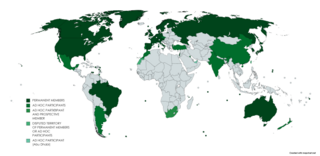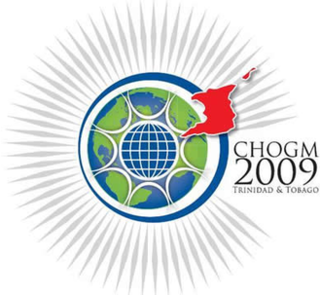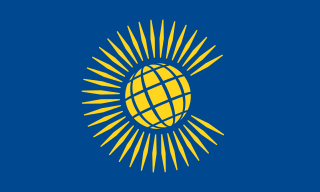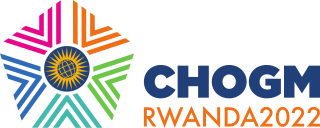The Commonwealth Heads of Government Meeting is a biennial summit meeting of the governmental leaders from all Commonwealth nations. Despite the name, the head of state may be present in the meeting instead of the head of government, especially among semi-presidential states. Every two years the meeting is held in a different member state and is chaired by that nation's respective prime minister or president, who becomes the Commonwealth Chair-in-Office until the next meeting. Queen Elizabeth II, who was the Head of the Commonwealth, attended every CHOGM beginning with Ottawa in 1973 until Perth in 2011, although her formal participation only began in 1997. She was represented by the Prince of Wales at the 2013 meeting as the 87-year-old monarch was curtailing long-distance travel. The Queen attended the 2015 summit in Malta and the 2018 summit in London, but was represented again by the Prince of Wales at the 2022 meeting in Rwanda.

The Council of the Baltic Sea States (CBSS) is a regional intergovernmental organisation working on three priority areas:

The New Partnership for Africa's Development (NEPAD) is an economic development program of the African Union (AU). NEPAD was adopted by the AU at the 37th session of the Assembly of Heads of State and Government in July 2001 in Lusaka, Zambia. NEPAD aims to provide an overarching vision and policy framework for accelerating economic co-operation and integration among African countries.
The Commonwealth Secretariat is the main intergovernmental agency and central institution of the Commonwealth of Nations. It is responsible for facilitating co-operation between members; organising meetings, including the Commonwealth Heads of Government Meetings (CHOGM); assisting and advising on policy development; and providing assistance to countries in implementing the decisions and policies of the Commonwealth.

Paris Club is a group of officials from major creditor countries whose role is to find co-ordinated and sustainable solutions to the payment difficulties experienced by debtor countries. As debtor countries undertake reforms to stabilize and restore their macroeconomic and financial situation, Paris Club creditors provide an appropriate debt treatment.

The African Peer Review Mechanism (APRM) is a mutually agreed instrument voluntarily acceded to by the member states of the African Union (AU) as a self-monitoring mechanism. It was founded in 2003.

The criteria for membership in the Commonwealth of Nations, which apply to current and prospective member states, have been altered by a series of documents issued over the past eighty-two years.
The Edinburgh Declaration was a declaration by the heads of government of the Commonwealth of Nations concerning the organisation's membership criteria. Part of the final communiqué issued at the end of the fifteenth Commonwealth Heads of Government Meeting (CHOGM), the Declaration was an endorsement of the report of the Inter-Governmental Group on Criteria for Commonwealth Membership (IGCCM). It was issued on 27 October 1997, in Edinburgh, the United Kingdom.
The Commonwealth Youth Programme, also known as CYP, is an international development agency working with young people between the ages of 15 and 29. Part of the Commonwealth Secretariat, CYP is active in the Commonwealth's 54 member countries. CYP has a head office in London with four centres in Africa, Asia, Caribbean and Pacific. Currently there are Four Regional Directors and 16 programme officers plus support staff are working there.
The Commonwealth Local Government Forum (CLGF) is a global local government organisation, bringing together local authorities, their national associations and the ministries responsible for local government in the member countries of the Commonwealth. CLGF works with national and local governments to support the development of democratic values and good local governance and is the associated organisation officially recognised by Commonwealth Heads of Government as the representative body for local government in the Commonwealth.
The Commonwealth Policy Studies Unit (CPSU) was a think-tank covering matters pertaining to the Commonwealth of Nations. It formed part of the University of London's Institute of Commonwealth Studies, itself part of the School of Advanced Study.

The 2009 Commonwealth Heads of Government Meeting was the 21st Meeting of the Heads of Government of the Commonwealth of Nations. It was held in Port of Spain, Trinidad and Tobago, between 27 and 29 November 2009, and was hosted by that country's Prime Minister, Patrick Manning.

The Commonwealth of Nations, often simply referred to as the Commonwealth, is an international association of 56 member states, the vast majority of which are former territories of the British Empire from which it developed. The chief institutions of the organisation are the Commonwealth Secretariat, which focuses on intergovernmental aspects, and the Commonwealth Foundation, which focuses on non-governmental relations among member states. Numerous organisations are associated with and operate within the Commonwealth.

The INGO Conference is the body representing civil society in the Council of Europe, a European organisation founded in 1949. The Council of Europe has 46 member states with some 800 million citizens and its seat is in Strasbourg, France. The current president is Gerhard Ermischer.

The Asian Forum for Human Rights and Development (FORUM-ASIA) [previously known as Forum-Asia] is a membership-based regional human rights organisation with 85 member organisations in 23 countries across Asia. It is committed to the promotion and protection of all human rights including the right to development.
The Partnership for Observation of the Global Ocean (POGO), which was founded in 1999, is a consortium of major oceanographic institutions around the world, represented by their directors. POGO's goal is to promote global operational oceanography, the implementation of a Global Ocean Observing System, and the importance of ocean observations for society. As of 2023, POGO has 56 member organizations. The current chair is Prof. Nick Owens (Scottish Association for Marine Science, UK).
The United Nations Non-Governmental Liaison Service is a programme of the United Nations mandated to promote and develop constructive relations between the United Nations and civil society organizations. UN-NGLS operates autonomously across the United Nations system and with civil society constituencies and social movements on cross-cutting and emerging issues on the UN agenda. For example, UN-NGLS currently focuses on the UN General Assembly preparatory process for negotiations of a global compact on migration, and high-level events organized by the President of the UN General Assembly. UN-NGLS advises civil society organizations on opportunities to engage with the UN and facilitates their participation in various UN processes and events. UN-NGLS has offices at UN headquarters in New York and is part of the United Nations Department of Global Communications.

The 2015 Commonwealth Heads of Government Meeting, also known as CHOGM 2015 was the 24th Meeting of the Heads of Government of the Commonwealth of Nations. It was held in Malta from 27 to 29 November. Sri Lankan President Maithripala Sirisena handed the position of Commonwealth Chair-in-Office to Maltese prime minister Joseph Muscat at the meeting.

The 2022 Commonwealth Heads of Government Meeting, also known as CHOGM 2022, was the 26th Meeting of the Heads of Government of the Commonwealth of Nations. The meeting was originally scheduled for 26–27 June 2020 in Kigali, Rwanda preceded by various fora between 22 and 25 June, but was postponed twice due to the COVID-19 pandemic. On 31 January 2022, it was announced that the meeting would be held on 24 and 25 June 2022 and the pre-meeting fora held from 20 to 23 June.
The Commonwealth Engineers' Council (CEC) is a network of professional engineering institutions of the Commonwealth, established to foster cooperation and exchange of information, support the development of indigenous engineering institutions, and foster the education, training and professional development of engineers. The CEC is an affiliated organisation of The Commonwealth.











